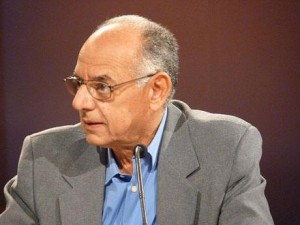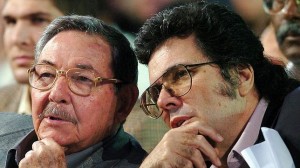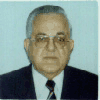Cuba replaces Abel Prieto in charge of Culture
Abel Prieto is removed but remains as an advisor to Raul Castro.
The Cuban government “liberated” from office the Minister of Culture, Abel Prieto Jimenez, and instead named Rafael Bernal Alemany, who until yesterday was envisaged to play as first deputy minister in the same portfolio.
Prieto was a key to bring the government’s relations with intellectuals. First from the presidency of the Union of Writers and Artists (UNEAC) and later as Minister of Culture, a position he held for 15 years.
The former minister had requested to leave the office for some time to deal with health problems and to resume his intellectual production, in fact this year he published a new novel.
It is one of the few ministers who left the government of Fidel Castro. Most were removed from their posts, some discreetly, others changing their functions, some with public accusations and at least one ended up in jail.
The critical years
Rafael Bernal Alemán. New Minister of Culture 
In 1991 Abel Prieto holds the presidency of the UNEAC, was a critical moment, the economy of the island suffered its worst crisis and the Cuban intelligentsia came into collision with the Ministry of Culture, clutching mechanisms that could no longer finance.
Until then, the state paid the salaries of artists and intellectuals and bought his works but the disappearance of the Soviet Union left the government without funds yet they refused to lose the monopoly of the cultural market.
The reaction was immediate, musicians, writers or painters did not return from his travels abroad and within the island born protest groups that reflected in his works and public discontent in letters which they lived.
The response of the Ministry of Culture was repressive, “rearranging” the most critical occupationally. One of them, professor of the School of Art, completed as an employee of customs, others joined the dissent, and many emigrated.
A key man
From the UNEAC Abel became the channel through which intellectuals and artists tramitaban their demands for change to adapt to the difficult times they lived. Thanks to its management were allowed to travel, to sell abroad and keep the money.
Painters, musicians, actors and writers were also able to live abroad for years without losing residence in Cuba. Soon this area became one of the most prosperous and diluted political friction.
When in 1997 he dismissed the former minister and appoint Prieto, the intelligentsia applauds although the measure does nothing more than institutionalize a role and a power which in reality was already several years.
A sample of that even today arouses sympathy Abel Prieto among Cubans is that the vast majority of comments from people who appear on the website Cubadebate are designed to recognize the role played in these 15 years.
Outside but near
Thus, the cultural front was, along with the military-one of the few in the time of Fidel Castro had initiated reforms to adapt to new realities, an official said were “updating” model.
Raul Castro y Abel Prieto/ Photo taken a week ago 
According to the Ministry, President Raul Castro Prieto refused to replace despite repeated requests for this. Even took out the Politburo but insisting on keeping ahead of Culture.
Apparently the government could not decide on which box would be able to replace guaranteed to keep harmony with Cuban artists and intellectuals, especially in a time of many changes in the country.
Starting the current government there is a protest of intellectuals, “the e-mail war”, following a TV praising 3 members of the censorship apparatus, responsible for monitoring sexual and ideological purity of culture, and ostracism to punish offenders.
Abel’s good relations with the intelligentsia allowed him to establish cordial relations.
Prieto out of the crisis meeting with most indignant to assure them that this is not the official policy and issued a public statement after decoupling the government of any claim of those hated characters.
This could explain why President Raul Castro does not want to Abel Prieto too far and appoints its advisor, bringing the work of the new minister is in some way supervised by his former boss.
Changes in the cabinet
Prieto out of the cabinet 20 ministers were replaced, there are only 2 of the previous government, are Manuel Marrero, head of tourism, and Interior, General Abelardo Colome Ibarra. The latter is a man very close to the President.
Some, former guerrilla fighters, including former ministers of health, Jose Ramon Balaguer and Communications, Commander Ramiro Valdes, now play other roles after facing serious problems in their ministries.
Among the most notorious cases publicly are the Vice President Carlos Lage and Foreign Minister Felipe Perez. Finally, the Minister of the food industry, Alejandro Roca, was sentenced to 15 years in prison for corruption.
Sources: CartasDesdeCuba/FernandoRavsberg/BBC/ InternetPhotos/TheCubanHistory.com
Letters From Cuba/ The Cuban History/ Arnoldo Varona, Editor
Cuba sustituye a Abel Prieto al frente de Cultura By Fernando Ravsberg
Abel Prieto se retira pero permanece como asesor de Raúl Castro.
El gobierno cubano “liberó” de su cargo al ministro de cultura, Abel Prieto Jimenez, y en su lugar nombraron a Rafael Bernal Alemany, quien se desempañaba hasta ayer como vice ministro primero en la misma cartera.
Prieto era una pieza clave para armonizar las relaciones del gobierno con los intelectuales. Primero desde la presidencia de la Unión de Escritores y Artistas (UNEAC) y posteriormente al frente del Ministerio de Cultura, cargo que ocupó por 15 años.
El ex ministro había solicitado dejar el cargo desde hace algún tiempo por enfrentar problemas de salud y también para reemprender su producción intelectual, de hecho este año publicó una nueva novela.
Es uno de los pocos ministros que quedaba del gobierno de Fidel Castro. La mayoría fueron removidos de sus cargos, unos de forma discreta, otros cambiándolos de funciones, algunos con acusaciones públicas y por lo menos uno terminó en la cárcel.
Los años críticos
Rafael Bernal Alemán. New Minister of Culture 
En 1991 Abel Prieto ocupa la presidencia de la UNEAC, era un momento crítico, la económica de la isla sufría su peor crisis y la intelectualidad cubana entraba en choque con el ministerio de cultura, aferrado a mecanismos que ya no podía financiar.
Hasta ese momento el Estado pagaba los salarios de los artistas e intelectuales y compraba sus obras pero la desaparición de la Unión Soviética dejó al gobierno sin fondos a pesar de lo cual se negaban a perder el monopolio del mercado cultural.
La reacción no se hizo esperar, muchos músicos, escritores o pintores no regresaban de sus viajes al extranjero y dentro de la isla nacieron grupos contestatarios que reflejaban en sus obras y en cartas públicas el descontento que vivían.
La respuesta del Ministerio de Cultura fue represiva, “reacomodando” laboralmente a los más críticos. Uno de ellos, profesor de la Escuela Superior de Arte, terminó como empleado de aduanas, otros se sumaron a la disidencia y muchos emigraron.
Un hombre clave
Abel prieto hizo entre los intelectuales la reforma migratoria que aun espera el resto del país.
Desde la UNEAC Abel se convirtió en el canal por el que los intelectuales y artistas tramitaban sus demandas de cambio para adaptarse a los difíciles tiempos que vivían. Gracias a su gestión se les permitió viajar, vender en el exterior y conservar el dinero.
Los pintores, los músicos, los actores y los escritores pudieron además vivir en el extranjero durante años sin perder la residencia en Cuba. En poco tiempo este sector se convirtió en uno de los más prósperos y los roces políticos se diluyeron.
Cuando en 1997 se destituye al anterior ministro y nombran a Prieto, la intelectualidad lo aplaude aunque la medida no hace más que institucionalizar un papel y un poder que en la realidad ya tenía desde hacía varios años.
Una muestra de las simpatías que aun hoy despierta Abel Prieto entre los cubanos es que la gran mayoría de los comentarios de la gente que aparecen en la web Cubadebate son dirigidos a reconocer el papel que jugó en estos 15 años.
Fuera pero cerca
Así, el frente cultural era -junto a las Fuerzas Armadas- uno de los pocos que ya en tiempos de Fidel Castro había iniciado reformas para adaptarse a las nuevas realidades, dicho de manera oficial estaban “actualizando” del modelo.
Raul Castro y Abel Prieto/ Foto tomada hace una semana
Según fuentes del Ministerio, el presidente Raúl Castro se negaba a sustituir a Prieto a pesar de las repetidas solicitudes de este. Incluso aceptó sacarlo del Buró Político del Partido pero insistiendo en mantenerlo al frente de Cultura.
Al parecer el gobierno no se decidía sobre que cuadro sería capaz de sustituirlo garantizando mantener la armonía con los intelectuales y artistas cubanos, sobre todo en un momento de tantos cambios en el país.
Iniciando el actual gobierno se produce una protesta de los intelectuales, “la guerra de los emails”, a raíz de un programa de TV que elogia a 3 miembros del aparato de censura, encargados de vigilar la pureza sexual e ideológica de la cultura, y castigar con el ostracismo a los infractores.
Las buenas relaciones de Abel con la intelectualidad le permitieron establecer relaciones cordiales. Foto: Raquel Pérez
Prieto sale de la crisis reuniéndose con la mayoría de los indignados para asegurarles que esa no es la política oficial y después emite un comunicado público desligando al gobierno de cualquier reivindicación de aquellos odiados personajes.
Todo esto podría explicar por qué el presidente Raúl Castro no quiere a Abel Prieto demasiado lejos y lo nombra su asesor, con lo que el trabajo del nuevo ministro estará de alguna forma supervisado por su antiguo jefe.
Los cambios en el gabinete
Con Prieto fuera del gabinete se han sustituido 20 ministros, solo quedan 2 del anterior gobierno, son Manuel Marrero, titular de turismo, y el del interior, General Abelardo Colomé Ibarra. Este último es un hombre muy cercano al Presidente.
Algunos, antiguos combatientes de la guerrilla, como los ex ministros de salud, José Ramón Balaguer y el de las Comunicaciones, Comandante Ramiro Valdés, cumplen ahora otras funciones tras enfrentar graves problemas en sus ministerios.
Entre los casos más sonados públicamente están los del vicepresidente Carlos Lage y el Canciller Felipe Perez. Finalmente el ministro de la industria de la alimentación, Alejandro Roca, fue condenado a 15 años de prisión por corrupción.
Sources: CartasDesdeCuba/FernandoRavsberg/BBC/ InternetPhotos/TheCubanHistory.com
Letters From Cuba/ The Cuban History/ Arnoldo Varona, Editor









